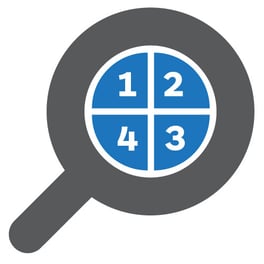4 Invisible Factors Damaging Your Laboratory Scale Readouts
Scales are much like printers, or computers – tools that businesses put a lot of faith into, but ones that also hold a lot of power over day-to-day operations. Even a small error or malfunction can bring important accuracy –dependent workflows to a screeching halt, and the cause isn't always immediately apparent.
 Here are only a few of the "invisible" forces that could be actively damaging your scale readouts:
Here are only a few of the "invisible" forces that could be actively damaging your scale readouts:
- Temperature - A scale is a sensitive machine, and just as extreme heat or cold can cause engines or rotors to malfunction in other industrial equipment, temperature does have an effect on your scale. Even if the space it is stored in is kept temperate, repeated measurements of hot or cold objects can cause metal to expand or contract, damage lubricants that keep moving parts running smoothly, and even cause rubber seals to crack or break. Without regular maintenance, you might not even know these issues have occurred until your readouts start fluctuating.
- Vibrations - Labs are home to a wide variety of equipment, which in turn introduces a host of variables. Equipment built for functions like separation or agitation often shakes far more than what it's supposed to. Even small, subtle vibrations are enough to change a scale's accuracy over time – thankfully, it's easy to re-calibrate it with regular maintenance.
- Air Currents - Just like nearby machines rocking the proverbial boat, continued exposure of "loose" scale components like hoppers to air currents can throw off internal mechanisms. HVAC outlets and vent fans are a necessary part of a professional lab environment, but they could also be dishing out wear and tear on your scale. While it's not always possible to keep your scale out of the path of air currents– particularly if they're used in your lab work – getting your weighing equipment examined can help mitigate the symptoms.
- Calibration - Even without environmental factors directly affecting scale alignment, repeated use over time can and will effect calibration. If you seldom use your scale, that could lead to issues as well – parts could become less responsive or "stick" when you do need to weigh something, leading to inaccurate results. Don't take the chance by trusting the wrong numbers: it's far more economical to schedule maintenance for your weighing equipment than to redo an entire experiment, after all.
Ensure Accuracy With Forethought
If these small errors are imminent, what can a forward-thinking lab do to prevent them? Just as you'd service safety equipment like fire extinguishers in the lab itself, scales should be routinely tested, cleaned, and calibrated to in order to perform well. While you might be able to do mental calculations for materials or chemicals without breaking a sweat, your scale is a delicate machine on the inside, and will need an experienced hand to diagnose and repair small calibration problems. All of the technicians at Alliance Scale are state licensed. Maintenance is your best defense against inaccuracies, so an appointment to service your entire laboratory weighing equipment should be made regularly.
Compliance and Peace of Mind
When working with volatile or potentially harmful substances, even the smallest increment of weight makes a very big difference. In the medical industry, micrograms could throw off a study; half of a fluid ounce could dangerously overdose or under dose a patient in need of medicine. For practical applications in your laboratory as well as industry compliance mandates, having a trustworthy scale is one of the most important items on your to-do list. Guessing or rounding is simply too risky of an undertaking, and in certain cases it might even be considered unethical. A well-built, well-maintained scale ensures that you'll always feel confident in your weighed results.
At Alliance Scale, we understand that of all the numbers you look to gather from your lab scales, the most important is 100% – the amount you should be relying on your readouts and findings. You have enough variables to cope with in experiments and studies; so make sure your scales and weighing equipment isn't an accidental variable standing between you and your findings. Request scale service and maintenance now and you'll feel the weight lift right off of your professional shoulders.


